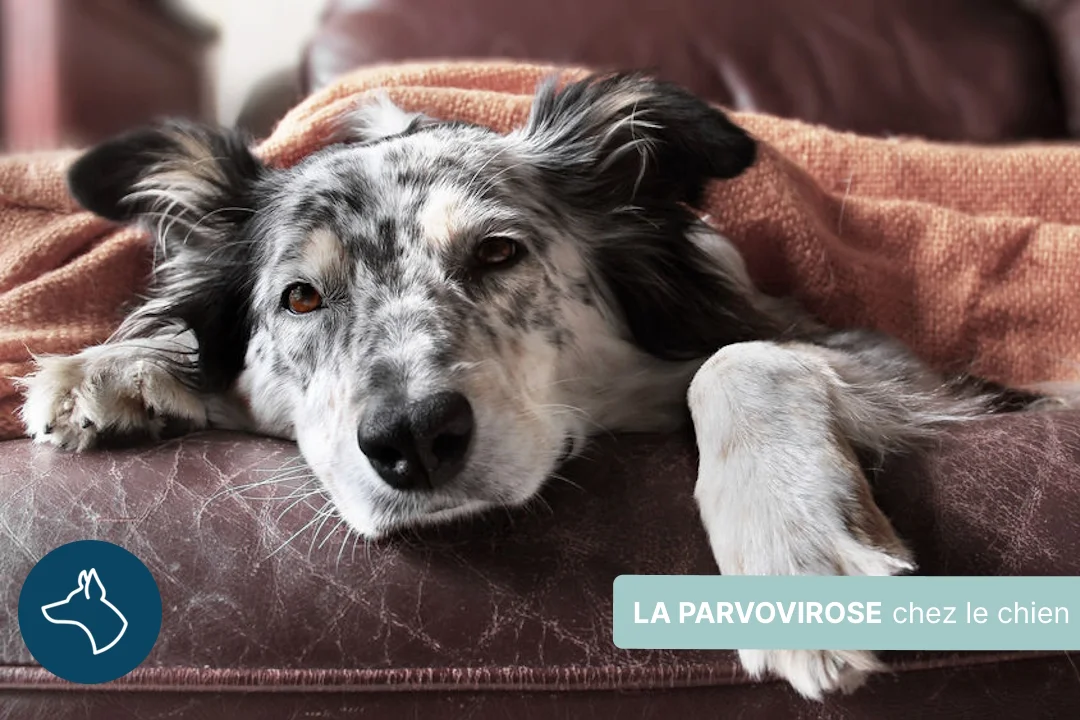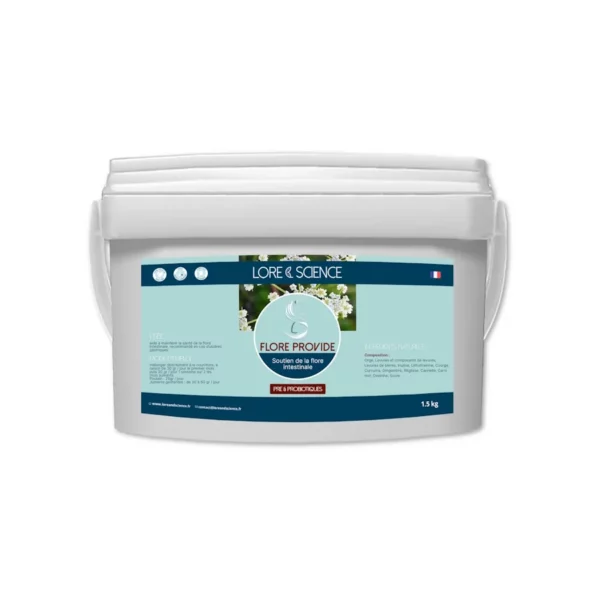Diseases affecting a dog's digestive system are dreaded and feared by owners. Parvovirus and gastroenteritis are two diseases that affect dogs' gastrointestinal systems, and can have serious consequences if not diagnosed and treated quickly. Lore & Science's specialists explain parvovirosis and gastroenteritis in detail: symptoms, treatment, preventive measures... You'll know everything you need to know to take the best possible care of your four-legged friend.
What are the symptoms of parvovirus and gastroenteritis in dogs?
Parvovirus symptoms
Canine parvovirus is a highly contagious viral disease that affects the gastrointestinal tract of dogs. The culprit behind this disease is the canine parvovirus, a pathogen that can survive for long periods in the environment and resist many disinfectants. Prevention is therefore essential.
The disease is generally characterized by a series of sudden and severe signs. One of the first signs is diarrhea. It is often abundant, liquid and may contain blood, which is particularly worrying. Repeated and sometimes violent vomiting may also occur. You need to be extremely vigilant to avoid the risk of malnutrition and dehydration, especially as the disease leads to a loss of appetite and weight, due to the dog's lack of interest in food. Finally, in response to the viral infection, the animal's body temperature rises, generating a fever that signals the immune system's response. All these symptoms lead to lethargy and apathy. He then appears exhausted and has difficulty moving around or engaging in normal activities.
It's important to note that the risk exists for dogs of all ages, although puppies and young individuals whose immune systems are not yet fully developed are particularly vulnerable. Parvovirus is a serious disease that requires immediate medical intervention to maximize the chances of recovery. All dog owners should be aware of the warning signs of parvovirosis, and act quickly if they suspect this potentially fatal disease.
Symptoms of gastroenteritis in dogs
Gastroenteritis, on the other hand, is a common ailment in dogs. Unlike parvovirus, which is caused by a virus, gastroenteritis can have many causes, including bacterial, viral or parasitic infections, food allergies, sudden changes in diet, or stress. Dogs suffering from gastroenteritis may present a variety of gastrointestinal symptoms, similar to those of parvovirus, such as :
- Diarrhea
- Vomiting
- Loss of appetite
- Lethargy
Added to these signals are possible abdominal discomfort, as well as flatulence or belching. Overall, the severity of symptoms can vary depending on the underlying cause of gastroenteritis.
How to treat canine parvovirus and gastroenteritis?
Treatment of parvovirus is mainly symptomatic, unlike that of gastroenteritis, which depends on the underlying cause. There are treatments common to both conditions. Your veterinarian will always be the best person to prescribe the appropriate treatment for your companion, depending on his or her profile and the diagnosis made.
Treatments for both parvovirosis and canine gastroenteritis generally include anti-vomiting and anti-nausea drugs. There are also medications to combat diarrhea. These symptomatic treatments relieve the animal and combat potential dehydration, which can have serious consequences.
In mild cases of gastroenteritis, rest and a light diet may be enough to relieve symptoms. You can also support your pet's recovery with natural food supplements, such as Gastro Dog. Formulated with a synergy of medicinal plants, this supplement helps dogs suffering fromstomach ulcers and/or gastric spasms. Derived from phytotherapy, it acts on the various organs in the chain that triggeracidity and ulcers, helping to heal gastric wounds and lesions. However, more serious cases may require veterinary intervention, including intravenous hydration and/or nutrition, antibiotics in the case of bacterial infection, or other specific treatments depending on the cause. In the case of parvovirosis, it's essential to contact your vet as soon as possible, as early treatment can greatly increase the chances of recovery.
How can I protect my dog from parvovirus and gastroenteritis?
How can gastroenteritis be prevented in dogs?
Preventing gastroenteritis in dogs is essential, and relies largely on rigorous food and environmental hygiene practices. It's imperative to ensure that your dog doesn't eat spoiled or potentially toxic food, as careless ingestion can trigger gastrointestinal disorders.
You should also avoid sudden changes in diet, as your companion's digestive system can be sensitive to sudden changes in diet. A gradual dietary transition over several days can reduce the risk of gastrointestinal upset associated with a change of food. In addition, it's vital to ensure your pet has constant access to fresh water, as adequate hydration is essential to maintain gastrointestinal health and prevent dehydration.
How can I protect my dog from parvovirosis?
Parvovirus prevention is mainly based on vaccination. Puppies are usually vaccinated against parvovirosis from an early age, and booster shots are given regularly throughout their lives.
In addition to vaccination, dog owners are responsible for creating a clean, hygienic environment for their pets. Clean living spaces, regular disinfection of areas frequented by the dog, and proper management of dog faeces all contribute to significantly reducing the risk of contamination by the virus.
Finally, another crucial aspect of prevention is to avoid your dog coming into contact with other dogs of unknown or unvaccinated status . This precaution minimizes opportunities for virus transmission between animals, and plays a key role in protecting the health of your faithful companion.
Parvovirus and gastroenteritis are two gastrointestinal diseases that can jeopardize our dogs' health. The key to protecting your dog's digestive health lies in prevention. Be sure to keep your dog's vaccinations up to date, especially for parvovirus. In addition, adopt rigorous hygiene practices and avoid potentially risky situations. Of course, if your dog shows symptoms of gastrointestinal problems, don't delay in consulting your vet for an accurate diagnosis and appropriate treatment.
Share your experience or questions with us in the comments ↓
















